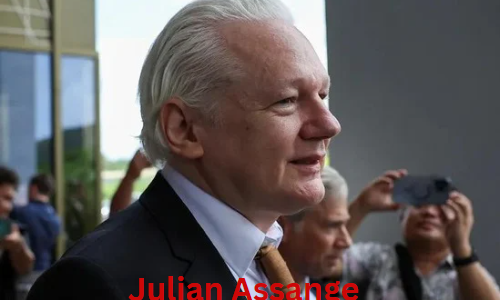Julian Assange, the founder of WikiLeaks, made an appearance in court in Saipan, bringing a 14-year legal battle to a finish.

Julian Assange, the founder of WikiLeaks, was released from a US court in Saipan after entering into a plea agreement with the US Justice Department to admit guilt to a single charge of espionage. He is currently traveling back to Australia.
Shortly after the 52-year-old left a courtroom in US territory after admitting to one count of conspiring to obtain and leak sensitive US national defense papers, Assange’s jet set off for Canberra.
KEEP READING:
Australia’s most senior diplomat in UK flying with Julian Assange to Saipan
Israeli forces step up strikes across Gaza
Gaza truce plan in balance as parties study Hamas response
He was allowed to go when US District Judge Ramona Manglona sentenced him to five years and two months, which included the time he spent in prison in the UK battling extradition to the US.
The judge declared on Wednesday, “It looks that you will be able to walk out of this courtroom a free man.”
Stella, his wife, said on social networking platform X, “I can’t stop crying.”
The Australian, who had previously arrived in the US on a private jet from the United Kingdom, grinned as he entered the courtroom wearing a black suit and a loose tie over his neck. Former prime minister Kevin Rudd, who was representing Australia, was also there.
Within, he responded to routine inquiries from the magistrate and heard the conditions of the agreement being deliberated.
Speaking before the court, Assange stated that although he thought the Espionage Act, under which he was accused, went against the US Constitution’s First Amendment rights, he acknowledged that it may be illegal to encourage sources to disclose secret material for publication.
He will be obliged to destroy material that was given to WikiLeaks in exchange for his plea.
Prosecutors stated that Saipan was selected for the court appearance because of Assange’s resistance to visiting the US mainland and because it is close to his Australian residence.
According to a subsequent flight schedule made public by Wikileaks, he was scheduled to arrive in Canberra, Australia, at 7:39 p.m. (09:39 GMT).
Anthony Albanese, the prime minister of Australia, called the hearing a “welcome development.”
He noted that Rudd was with Assange and that Australia had utilized “all appropriate channels” to assist a “positive outcome” in the matter.
“Mr. Assange’s case has been dragged out for far too long, regardless of your opinions about him. Albanese told reporters in Canberra, “We want him brought home to Australia. There is nothing to be gained from his continued incarceration.”
Assange’s representative announced that the founder of Wikileaks will not be making a statement or fielding questions after the judge’s decision. Jennifer Robinson, his attorney, called it a “historic day” and expressed gratitude to Albanese for his assistance in enabling Assange’s release.
Another attorney for Assange, Barry Pollack, said that his client had been the victim of injustice.
“Julian Assange’s prosecution is unprecedented,” he declared to reporters outside the court. “The United States has never utilized the Espionage Act in its 100 years to go after a publisher or journalist like Mr. Assange. Mr. Assange has endured great suffering after disclosing genuine, significant, and noteworthy information, such as the fact that the US had committed war crimes.
The computer specialist Assange’s court appearance and subsequent release mark the end of a 14-year legal fight. Assange gained notoriety among proponents of press freedom because of his widely used secret-sharing website WikiLeaks, where he claimed to have behaved as a journalist uncovering misconduct by the US military.
Assange resisted extradition to the US, where he faced 18 criminal charges, and spent more than five years in a high-security prison in the United Kingdom and seven years inside the Ecuadorean Embassy in London. The claims of sex crimes in Sweden were eventually withdrawn.
Supporters of Assange see him as a victim because he revealed wrongdoing by the US military in its wars in Afghanistan and Iraq. According to Washington, lives were endangered when the classified information were made public.


[…] WikiLeaks’s Julian Assange declared ‘free man’ in Saipan after US plea deal […]